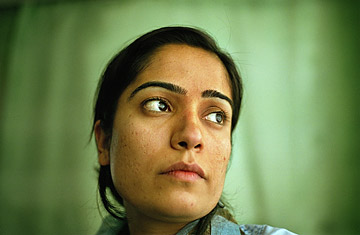
Prominent Afghan women's rights activist Malalai Joya in Kabul, August 2007
It appears that Afghan warlords and religious fundamentalists are not the only ones who don't want Malalai Joya in the public eye. The outspoken women's rights activist and fierce critic of the war in Afghanistan has been denied a travel visa on the eve of a three-week U.S. speaking tour. According to Joya, the reasons given by an embassy officer — that she is "unemployed" and "lives underground" — make no sense, since she's been the target of five assassination attempts that have forced her to live in hiding for several years with a team of armed bodyguards. U.S. officials are fully aware of that fact, she notes, and have never rejected her applications in the past. So why now?
"They are just mere excuses," she tells TIME in an e-mail interview from a location she would not disclose for security reasons. "[The Afghan government] has probably requested the U.S. to not let me enter ... because I am exposing the wrong policies of the U.S. and its puppet regime at the international level."
Joya, named one of TIME's 100 most influential people in the world in 2010, has never minced words. In December 2003, as a 24-year-old elected delegate, she denounced mujahedin leaders at a loya jirga (national assembly) as warlords guilty of destroying the country and killing thousands during the brutal civil war that preceded the Taliban regime. Her two minutes at the microphone provoked an uproar, and catapulted her to fame. In a 2007 TV interview, she likened her mostly male colleagues to farmyard animals, earning her more death threats and an indefinite suspension from parliament. Since then, she has campaigned behind the scenes at home — and widely abroad — blaming the U.S. for civilian deaths and for working with corrupt power brokers who have debased Afghan women.
The latest sign of trouble for women in her eyes? President Hamid Karzai's administration drafting new rules that would ban private shelters for women who have run away from abusive relatives, placing them under government control. Under the new policy, women would have to submit to medical examinations and forced eviction if their families demand their return. Joya and a host of human-rights activists insist these restrictions show the lengths Karzai is willing to go to appease fundamentalists sympathetic to the Taliban, and fear it could foreshadow greater setbacks for women if and when a peace deal is struck.
Similarly, there are fears Afghan women's rights are taking a backseat on the U.S. side as war fatigue and economic malaise on the home front ramp up the pressure on officials to find an exit. Earlier this month the U.S. Agency for International Development removed women's rights requirements for contractors bidding to be part of a $140 million land-reform program. Winning contractors initially had to meet specific goals — a 50% increase in the number of deeds granting women title, regular media coverage on women's land rights, and the inclusion of women's rights material in school curriculums. Now they don't.
Given the fresh controversy, Joya's supporters argue that her visa denial is no accident. On this trip she was to promote a new edition of her memoir, A Woman Among Warlords, at events around the country with other prominent antiwar critics like Noam Chomsky. Sonali Kolhatkar of the Afghan Women's Mission, a U.S.-based nonprofit that co-sponsored the speaking tour, says there were no major snafus in arranging four previous visits. "I can't come to any other conclusion than that it's somehow politically motivated," she says. A U.S. embassy official declined to comment.
Visa decisions rest with embassy officials in the country where an application is made, and can only be overturned by intervention from the higher echelons of the State Department. Several U.S. Congressmen are drafting a letter calling for Joya to be granted entry, while the American Civil Liberties Union has appealed to Secretary of State Hillary Clinton, underscoring a 2010 paper written by a department legal adviser that recommends "significant and sympathetic weight" be given to applicants visiting for educational activities. In the face of criticism that women's rights are being rolled back in Afghanistan, Clinton asserted before a House panel on March 10 that Washington is providing more funding for women's education, health care and political empowerment programs than ever before.
Yet even with her status in limbo, Joya is unrelenting. Secretary Clinton's comments are "not out of genuine concern," she says. "For the past 10 years, the U.S. policymakers misused the plight of Afghan women as an excuse to advance the war in Afghanistan and attain public support for it." With a growing majority of the American public now opposed to the decade-long conflict, she is not likely to back off anytime soon.
